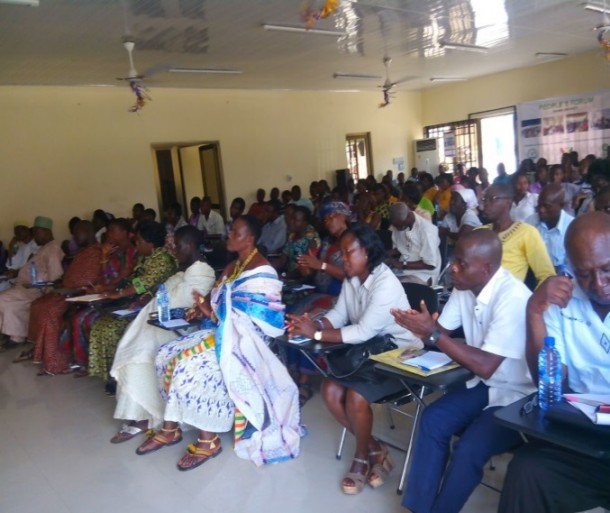In Ghana, citizens are leading the charge on government accountability
 Flag of Ghana in the town of Prestea, where Oxfam parter organization in Ghana, WACAM has been supporting the Concerned Citizens Association of Prestea in its efforts to negotiate with a mining company around issues related to air and water pollution, and the proposed expansion of mining operations. Photo: Jeff Deutsch / Oxfam America GHANA by Jeff Deutsch, APR 2011
Flag of Ghana in the town of Prestea, where Oxfam parter organization in Ghana, WACAM has been supporting the Concerned Citizens Association of Prestea in its efforts to negotiate with a mining company around issues related to air and water pollution, and the proposed expansion of mining operations. Photo: Jeff Deutsch / Oxfam America GHANA by Jeff Deutsch, APR 2011
Ghanaian citizens are creating opportunities for greater accountability and transparency, and bringing their government representatives along with them.
Abdulkarim Mohammed is the West Africa Regional Program Advisor for Active Citizenship at Oxfam America.
Under the ‘pseudo-democratic’ decentralized governance system practiced in Ghana, the President appoints virtually every public official in the country. This includes the Chief Executives who head the local government assemblies at the Metropolitan, Municipal and District levels. Other than having their nominations approved by a two-thirds majority of the assembly they’ll lead, these government appointees often do not see accountability to the people as key to their positions because they serve at the pleasure of the President.
This structure has always made the ideal bottom-up process of development planning a difficult task – but citizens in two Ghanaian districts – Shama and Jomoro – are trying to change that. Friends of the Nation, a local civil society organization and Oxfam partner, is charting a new course for local government accountability in both districts. The two districts are strategic because they are located in the oil-rich Western Region of Ghana, where expectations are high for translating petroleum wealth into rapid social and economic development.
In such a critical environment, Friends of the Nation is supporting ongoing fiscal decentralization efforts and increasing citizen participation in the governance and accountability of public resources by helping District Assemblies make the development planning process more inclusive.

The shining example of this work has been the establishment of People’s Forums, which provide a platform for ordinary citizens to be informed on the state of District development plans. Each forum is led by the District Chief Executive who delivers a “State of the District” speech that covers everything from health and education, to tourism and natural resource management.
The most recent forums attracted over 300 residents in each district. Participants included traditional leaders, youth and women’s groups, people with disabilities, community-based organizations, trade associations, and more. And while the turnout was impressive, an additional 10,000 people were able to participate from afar through a local radio broadcast. During the open forum, residents queried their representatives on the abandoned projects of previous administrations, justification of project costs, under-performance of the basic education system, and the poor state of infrastructure like markets and roads. For many of the participants, this was the first time that public officials had appeared before them to render accounts of their stewardship of public resources, and they were excited about the opportunity.

“This forum has really informed us on how our taxes are being used to address our needs and aspirations. It is important that public officers periodically account for their stewardship,” said local fisherman Aba Quansah. “We are grateful to the Assembly, Friends of the Nation and Oxfam for this opportunity; we look forward to attending the next forum.”
The communities of Shama and Jomoro aren’t the only ones getting excited. Since the first forum, the initiative has motivated citizens of nearby districts to demand similar accountability forums, citing Shama and Jomoro as models worthy of emulation.
The momentum continues to build. The interest in transparency and accountability generated by the People’s Forum has spurred both citizen groups and public bodies to seek and provide space for consultation and accountability. Most recently, Jomoro and Shama Assemblies began erecting notice boards in key public centers to display the District’s quarterly revenues and expenditures.
“Being accountable to the people provides the incentives for the citizenry to pay their taxes, contribute to revenue mobilization and participate actively in decision-making,” said Shama District Assembly Budget Analyst, Vincent Mwauli Wordi. “We are very much committed to deepen this process to serve as example for other Districts to emulate.”
It’s a true mark of success of the People’s Forums that the once distant political class is now making commitments and taking steps to be more accountable. We’re hoping the accountability momentum only grows from here.